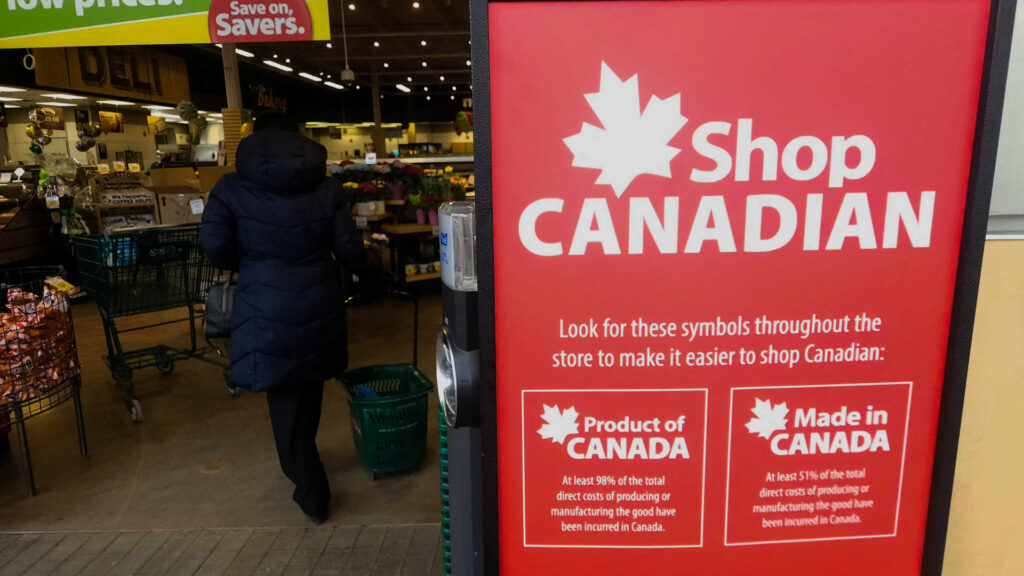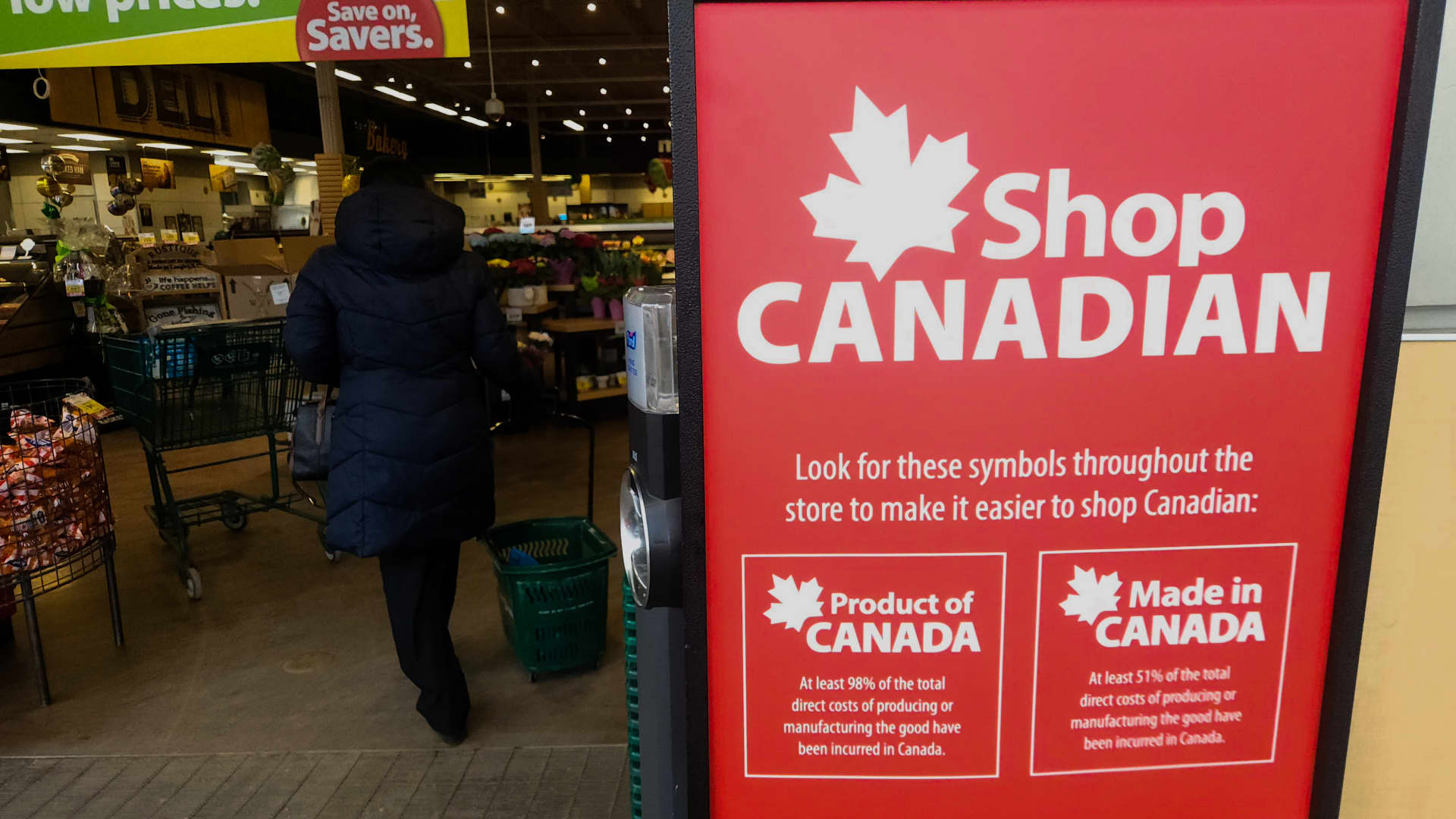
Trump Canadian Tariffs Boycott: Small Businesses React with National Pride
Trump Canadian Tariffs Boycott: Small Businesses React with National Pride
Published April 18, 2025 | Last Updated: April 20, 2025
‘Shop Canadian’ poster displayed in an Edmonton storefront reflects the Trump Canadian tariffs boycott movement sweeping across businesses. (Artur Widak | Nurphoto | Getty Images)
The Trump Canadian tariffs boycott movement is gaining momentum as small businesses across Canada respond to President Trump’s 2025 trade measures with unprecedented displays of nationalism, product boycotts, and proudly Canadian marketing campaigns. This grassroots economic resistance signals a potentially irreversible shift in the US-Canada trade relationship that reached $762 billion in 2024.
Table of Contents
Trump Canadian Tariffs: Impact on Cross-Border Trade
The Trump Canadian tariffs introduced in early 2025 have transformed economic policy into a question of national identity for businesses north of the border. With bilateral trade between the United States and Canada totaling an impressive $762.1 billion in 2024, the stakes couldn’t be higher for both economies.
Canadian exporters, who sent over three-quarters of their goods to the US market last year, now face significant barriers. Meanwhile, American imports, which constituted nearly half of all goods entering Canada, are increasingly subject to both official retaliatory measures and unofficial consumer boycotts.
The Trump administration’s tariff package includes several components that directly target Canadian industries:
- 10% tariff on Canadian energy exports – a cornerstone of cross-border trade
- 25% tariffs on various Canadian imports (with limited USMCA exceptions)
- 25% tariff on vehicles not assembled in the US (severely impacting Canadian auto manufacturing)
- 25% tariff on auto parts scheduled for implementation in May 2025
Trump Canadian Tariffs Impact Analysis
President Trump has justified these broad tariffs as necessary to “rebalance international trade” and revitalize American manufacturing. However, the measures are disrupting supply chains that have been seamlessly integrated for decades under NAFTA and USMCA frameworks. For Canadian businesses with long-standing US partnerships, these tariffs represent not just economic challenges but a fundamental breach of trust.
Canadian Business Response: Boycotts and Patriotism
While the Canadian government has implemented official retaliatory tariffs, the Trump Canadian tariffs boycott movement has taken on a life of its own through grassroots business initiatives and patriotic consumer campaigns. Small businesses across Canada are leveraging national pride as both a marketing tool and a form of economic protest.
Coffee Chain Rebrands: From “Americano” to “Canadiano”

Balzac’s Coffee Roasters menu showing the rebranded “Canadiano” coffee as part of the Trump Canadian tariffs boycott movement. (Matthew Mikrut | CNBC)
Balzac’s Coffee Roasters, with multiple locations throughout Ontario and Toronto, has made a symbolic statement in response to the Trump Canadian tariffs boycott movement. The chain has renamed the classic “Americano” coffee as the “Canadiano,” complete with a patriotic maple leaf symbol on their menus.
This rebranding represents more than clever marketing—it reflects a growing sentiment that consumer choices can be expressions of national solidarity during trade disputes. The company’s decision has resonated with customers, who increasingly view purchasing decisions through a patriotic lens.
Canadian Grocers: Tariff Labeling and Maple Leaf Marketing

Your Independent Grocer displays prominent “Made in Canada” labels to help consumers participate in the Trump Canadian tariffs boycott. (Cameron Costa | CNBC)
Your Independent Grocers, operating under the Canadian-traded Loblaw Companies umbrella, has implemented a comprehensive labeling system in direct response to the Trump Canadian tariffs:
- Products manufactured in Canada receive prominent maple leaf badges
- Items affected by Trump’s tariffs are marked with a special “T” logo both in-store and online
- This transparent system enables consumers to make informed choices about supporting domestic products
This visual identification system serves dual purposes—helping consumers avoid products affected by tariffs while promoting Canadian-made alternatives. The approach represents a sophisticated response to trade tensions that empowers consumers to align purchasing decisions with national economic interests.
LCBO’s Trump Canadian Tariffs Boycott on American Alcohol

LCBO worker removing American wine bottles as part of the institutional Trump Canadian tariffs boycott. (Christopher Katsarov Luna | Bloomberg | Getty Images)
The most dramatic example of the Trump Canadian tariffs boycott comes from the Liquor Control Board of Ontario (LCBO), which ceased purchasing all US-made alcohol products on March 4, 2025. As a government-controlled retailer with significant purchasing power, LCBO’s boycott delivers a substantial economic message to American producers.
At LCBO retail locations, signage explaining the absence of familiar American brands carries an explicitly patriotic message: “For the good of Ontario, for the good of Canada.” This institutional boycott exemplifies how the Trump Canadian tariffs have triggered responses that blend economic policy with expressions of national identity.
Interestingly, the LCBO boycott highlights the complex nature of integrated North American supply chains. Products manufactured in Canada by American-owned companies continue to be sold. For instance, locally-produced Coors Light remains available despite Molson Coors’ multinational ownership—illustrating how modern supply chains complicate straightforward boycott efforts.
Economic Consequences of the Tariff Standoff
Beyond symbolic gestures, the Trump Canadian tariffs boycott is creating measurable economic impacts across small business communities. According to the Canadian Federation of Independent Business (CFIB), which represents over 100,000 small businesses throughout Canada, the effects are both widespread and deeply felt.
A December 2024 CFIB survey revealed approximately half of their member businesses directly engage in US-Canada trade. This figure doesn’t account for countless additional businesses dependent on suppliers or customers with American trade connections, suggesting even broader economic ramifications.
By late March 2025, the Trump Canadian tariffs boycott had produced several quantifiable trends:
- More than 25% of surveyed businesses reported increased demand for Canadian-owned products
- Over 50% identified the US as an unreliable trading partner
- A significant number sought guidance on renegotiating contracts with American suppliers
Canadian Business Adaptation to Trump Canadian Tariffs
Small businesses across Canada are implementing strategic responses to navigate the new tariff environment:
- Supply chain diversification to reduce American import dependence
- Strategic marketing of “Made in Canada” as a competitive advantage
- Contract renegotiations with US partners to address tariff costs
- Exploration of non-American export markets
- Investment in domestic production capabilities for previously imported goods
American Soft Power Erosion in Canada
While the Trump Canadian tariffs are designed as instruments of economic “hard power,” they may be inadvertently undermining America’s “soft power” influence with its northern neighbor. The erosion of goodwill in a historically strong relationship could have strategic implications beyond trade balance sheets.
Former Secretary of State Antony Blinken highlighted this concern when speaking to CNBC, noting that declining American soft power represents his “biggest fear” in the current trade environment. “The idea that we would not only see China try to develop more soft power, but that we would cede our own…not good for the country, not good for our interests,” Blinken remarked.
This dimension of the Trump Canadian tariffs boycott suggests potential geopolitical consequences that transcend immediate economic calculations, potentially creating openings for competing powers in North American relations.
Future of US-Canada Trade Relations
The Trump Canadian tariffs boycott raises profound questions about the long-term trajectory of North American economic integration. Even if tariffs were eventually reduced or eliminated, Canadian businesses may remain hesitant to fully recommit to US partnerships.
CFIB’s Corinne Pohlmann articulates this concern: “While we’d welcome a permanent reprieve from tariffs, the trading relationship between Canada and the United States has been fractured and may never be the same again.” This sentiment suggests the Trump Canadian tariffs boycott could create lasting changes in trade patterns that persist beyond current policy debates.
Long-Term Consequences of Trump Canadian Tariffs
- Permanently reduced US-Canada economic integration
- Diversification of Canadian trade relationships beyond North America
- Increased domestic production capacity in Canada
- Higher consumer prices due to supply chain inefficiencies
- Diminished bilateral goodwill affecting cooperation on other issues
Frequently Asked Questions
Key Takeaways
Essential Points About the Trump Canadian Tariffs Boycott
- The Trump Canadian tariffs have triggered both economic and emotional responses from Canadian small businesses, with many viewing the measures as a betrayal of longstanding bilateral trust.
- Canadian businesses are responding with patriotic marketing campaigns, boycotts of American products, and prominent labeling systems highlighting domestic alternatives.
- CFIB survey data shows over half of Canadian small businesses now consider the US an unreliable trading partner due to the Trump Canadian tariffs.
- The LCBO’s institutional boycott of American alcohol products represents one of the most visible organizational responses to the tariffs.
- Even if the Trump Canadian tariffs are eventually reduced or eliminated, the damage to trade relationships may persist, permanently altering North American economic integration.
- Beyond immediate economic impacts, the Trump Canadian tariffs boycott may erode America’s “soft power” influence, creating strategic concerns that extend beyond trade balance considerations.






